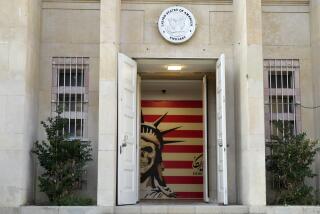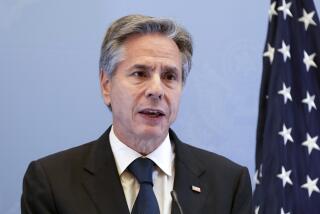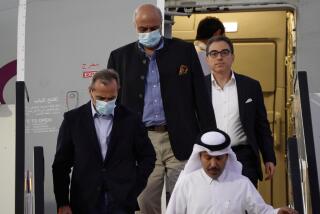Iran nuclear deal offers flicker of hope to Persians in Southern California
Parviz Gharib-Afshar fled Iran 35 years ago to protect his American wife and two children from the “overbearing religiosity” that swept through his home country. A journalist for Iran’s state-run media at the time, he always told himself he would go back once things got “a bit better.”
But that day never came.
So like so many others, he made Los Angeles home and began a new career in film here.
The nuclear agreement between Iran and six world powers announced Tuesday offered a flicker of hope for the first time in a long time that his homeland and his adopted home could end decades of animosity.
“Iran is finally in the news for the right reasons,” said Gharib-Afshar, 72, who moved to the U.S. just as the 1979 Islamic Revolution began.
He hopes the deal will begin a thaw that could eventually allow him to travel back to Iran.
“The time to get my wish will come soon,” he added.
Southern California is home to the largest Persian community outside of Iran, with population estimates varying between 200,000 and 500,000 people.
As in so many expat communities, there are some eager for the two countries to come together and others who remain skeptical about the U.S. doing business with the Islamic Republic they fled.
But Tuesday marked a milestone.
Jimmy Delshad, former mayor of Beverly Hills, said he remains dubious that the nuclear deal would trickle down to make a difference to the average Iranian.
“I doubt it, but I am hopeful,” he said. “I am happy for the people of Iran ... maybe there will be a more open society.”
Delshad doesn’t think the Iranian government will make sweeping human rights changes but hoped the deal could make life easier on the diaspora because there could be more open communication between nations.
“It will be easier reaching out to people in Iran,” he said. “It will be good to have the freedom of travel and, hopefully, of business.”
The agreement tightens restrictions on Iran’s nuclear program and gives international agencies broad monitoring powers designed to detect any secret nuclear activities.
“Some people say, ‘Why are you excited? There are human rights being violated by the government,’” said Bita Milanian, 41. “By no means am I saying those things are to be ignored, but this is step number one, and a huge step number one toward changes that can happen there.”
Milanian moved to L.A. in 1989 and hasn’t returned to Iran since, but not for a lack of desire. She said she hopes the deal will make it easier for her to go back because she would like to share Iranian culture with her friends.
“My American friends tell me how much they want to go as tourists and explore the country,” Milanian said. “I’m truly hopeful that this will be another element of the cultural exchange that has been missing the last 20-plus years.”
The negotiations presented a welcome glimmer of hope that diplomacy could prevent military conflict between the United States and Iran, said Sam Yebri, but some Iranian Americans have “deep concerns” about the deal.
Religious minorities and Iranians who fled the country during the revolution “understand who is across the negotiating table,” he explained.
“There is concern of whether this deal ends the quest to build nuclear weapons, or does it punt the ball down the field for 10 or 15 years,” said Yebri, president of 30 Years After, an Iranian Jewish nonprofit organization based in Los Angeles.
Yebri said the hopes that Iran will deliver on the deal are “really misguided without any good-faith sign in English by leaders that matter.” Photos of Iranian Foreign Minister Mohammad Javad Zarif smiling in private meetings aren’t enough, he said.
Gharib-Afshar disagreed. A self-proclaimed “optimist amid the pessimists,” he said it’s time to support the two governments rather than focusing on years of animosity.
“Let’s talk about a shared vision for the future instead,” he said.
“I think anything that moves us toward opening up relations and turns us away from military actions is good,” said Roxanne Varzi, associate professor of anthropology at UC Irvine. “There’s so much the two countries need to work on together.”
Varzi, who moved to the U.S with her parents shortly after the revolution, said she supports any deal that opens up relations between the two countries. Sanctions, she argued, have done nothing but hurt the Iranian middle class.
“It’s like cutting off an umbilical cord in a way. You can’t even send a DHL package right now,” Varzi said. “If people who have sick family members can’t get to Iran, it makes it that much more difficult to have any sort of future with the country.”
An open relationship between Iran and the U.S. can “only move us toward something that is healthy,” she added.
“We just need to take a chance,” she said.
More to Read
Start your day right
Sign up for Essential California for news, features and recommendations from the L.A. Times and beyond in your inbox six days a week.
You may occasionally receive promotional content from the Los Angeles Times.







